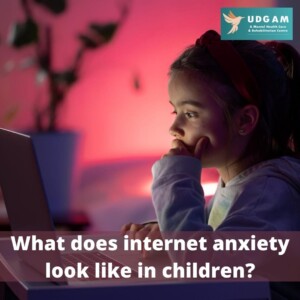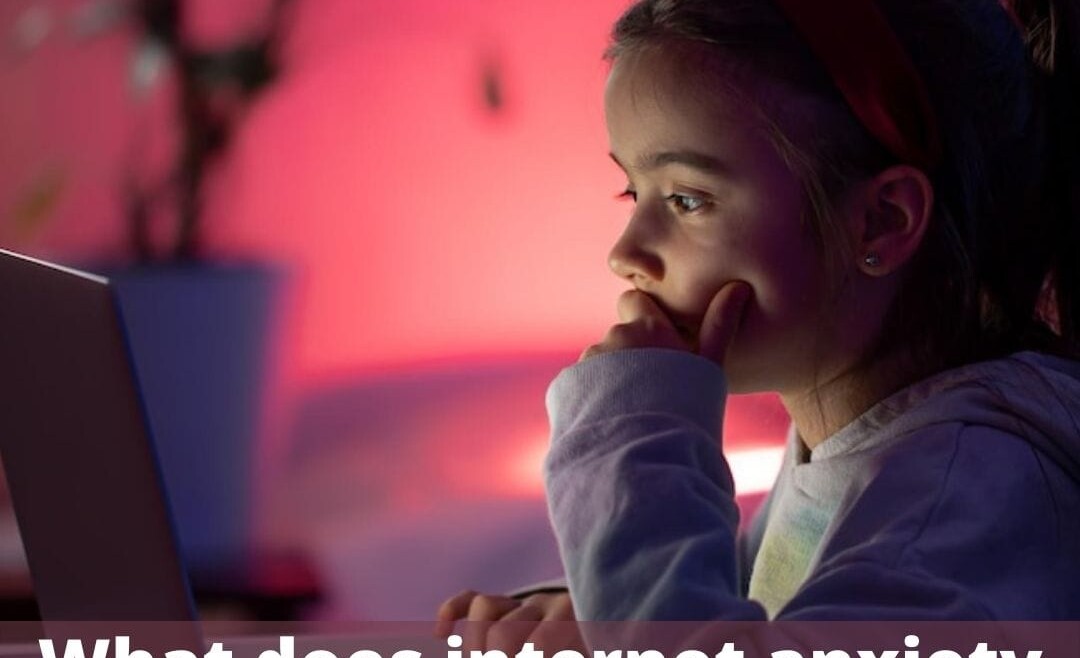What Does Internet Anxiety Look Like in Children?
Being in the new age of technology, half of our world lives online- working, playing, or chatting. For every age familiar with the internet, there is a certain dependency found.
Excess to everything is always said to be bad, and that is true in this case. From being able to chat with friends to being stuck on your social media pages, for hours creating content, or just browsing, we often forget the amount of time we spend on the internet.
Internet addiction is a disorder where an individual shows obsessive or problematic use of the internet, is anxious if not online, or constantly thinks of being online, so much so that their daily living is affected.
It is hard to describe internet addiction in a day and age where most of the work is done online. Describing a person with addiction or dependency on the internet is difficult, yet very necessary. the symptoms include:

- Refusing to eat without being able to watch a video or play a game
- Lying about the time spent online
- Avoiding homework or chores to play games
- Withdrawing from social interactions
- Does not engage with other kids
- Refusing to go outdoors to play
- Shows anxious behavior when off the internet
- Happiness when using the computer- relieving the unhappy/anxious mood
Who is the Instigator?
A predicament is always followed by a search for the source. But what can be the instigator of this addictive behavior? It can be the society, family, and children themselves. Society demands children to grow up with all the latest tools to get a good job, excel in the social world, and feel worthy of belonging to the community. Even the education system makes people follow a set structure. From peers demanding to play the newest game and to be able to socialize online to gain friends. Our children are rushed into this complicated world, without the proper means to handle themselves.
Children especially between the ages of 10 to 18 are victims of peer pressure, and at this age, their drive to be the best in the group or to be liked by others is very high. According to many theories, their dilemma at this age is to do something worthwhile, and interesting and formulate an identity.
And what can be a better way to do this than to go to the online world, where there is the latest information, anonymity, and plenty of distractions from anxiety and other problems are available. A virtual friend is easier to maintain than a real one.
As parents, we play a role in involving the child with the use of the internet. We are on our laptops, constantly working, on our phones chatting, and on our tabs watching the latest movies.
To avoid tantrums or to be able to feed the child easily and quickly, many parents use mobile phones or the internet as a bribe. Children soon learn that they can easily refuse to eat or do homework unless they are given some screen time. This tendency can turn into a vicious cycle where the tantrums might get worse every time you refuse.
Lack of Personal Responsibility?
A major factor in internet use is the willingness of the individual. With self-control or a natural dislike, children can remove themselves from falling into the social media black hole. But with the current social climate, it might not be entirely possible to forgo the use of the internet.
To keep up with the latest trends, build work ideas, complete an education, and connect with others, the use of the internet is necessary.
For a young child to understand that being addicted to an activity is detrimental to health, is not easy and might need guidance from family.
How to Prevent Your Child from Developing IA?
We cannot control what is going to happen if we don't take an active part in it. Enabling a child's fascination with the internet without proper communication or supervision is unhelpful. You can take these steps to prevent IA in your child.
- Avoid excessive screen time in the house, follow the same rules you set for your children, and have minimum screen time out of work. This way children can imitate a better behavior
- Since many classes are happening online, limit their screen time outside of school.
- Spend more time with your child, and encourage them to interact more with you and others.
- Monitor internet use and type of activity, especially for younger children.
- In case of tantrums, do not withdraw or give in, explain to the child, you’re reasoning as best as possible.
- Encourage outdoor/physical activity, as much as possible.
- Encourage the child to pursue a hobby of their liking, so that they can pour their dedication into that activity.
In case of severe symptoms, get help from professionals as soon as possible. At Udgam Clinic, we advise parents to be open in their discussions with children, they need complete support to develop better routines and learn helpful habits. Psychologists at the center, take care to protect children's privacy and information from the public. They are trained to give therapy, do personality development, and enhance academic skills.
To read more, please stay tuned to our website. www.udgammentalhealthcare.com
Anuja Sathe
Counselling Psychologist




